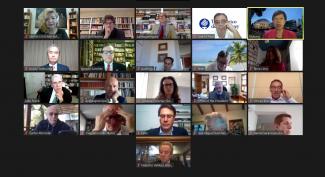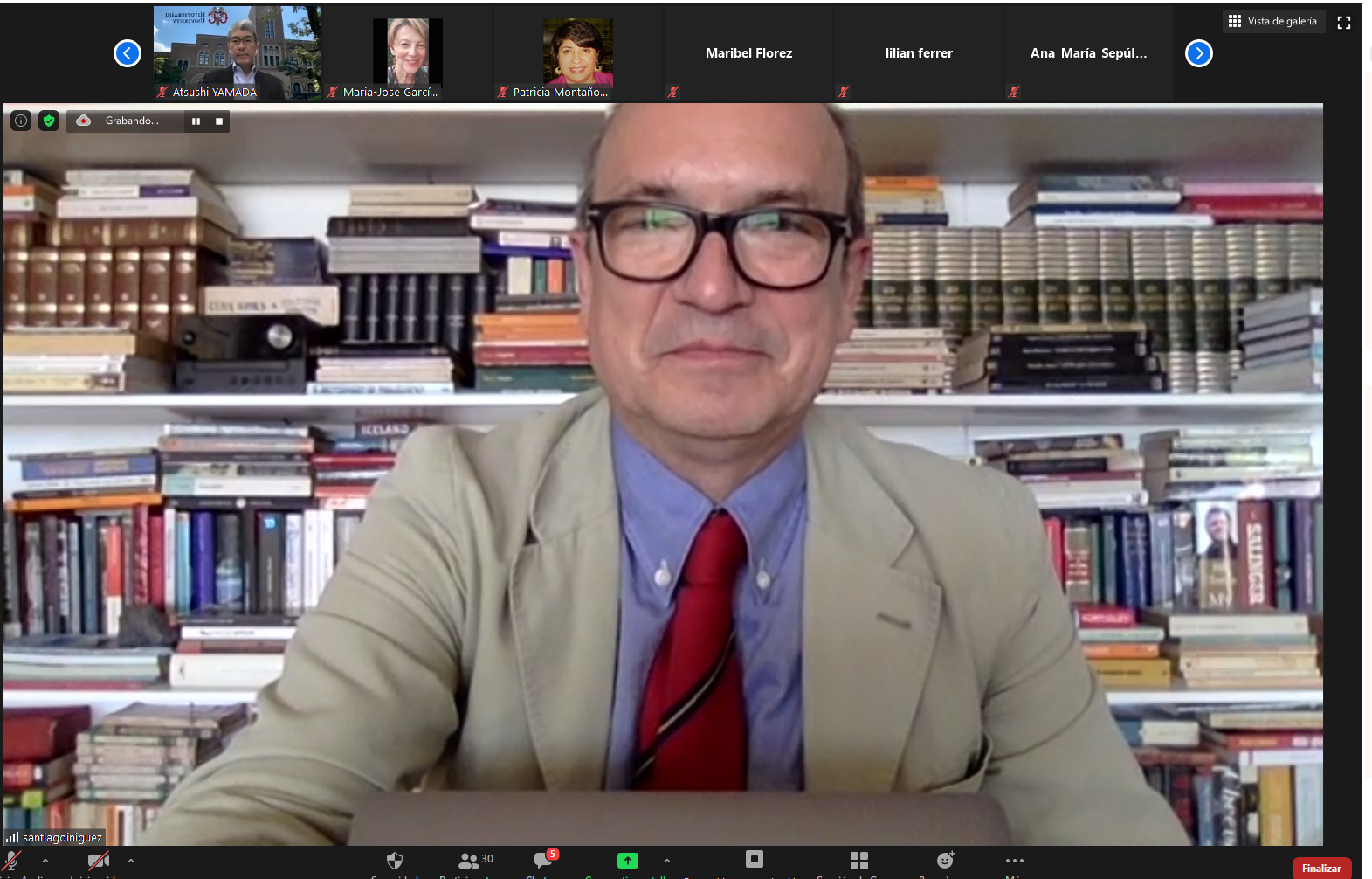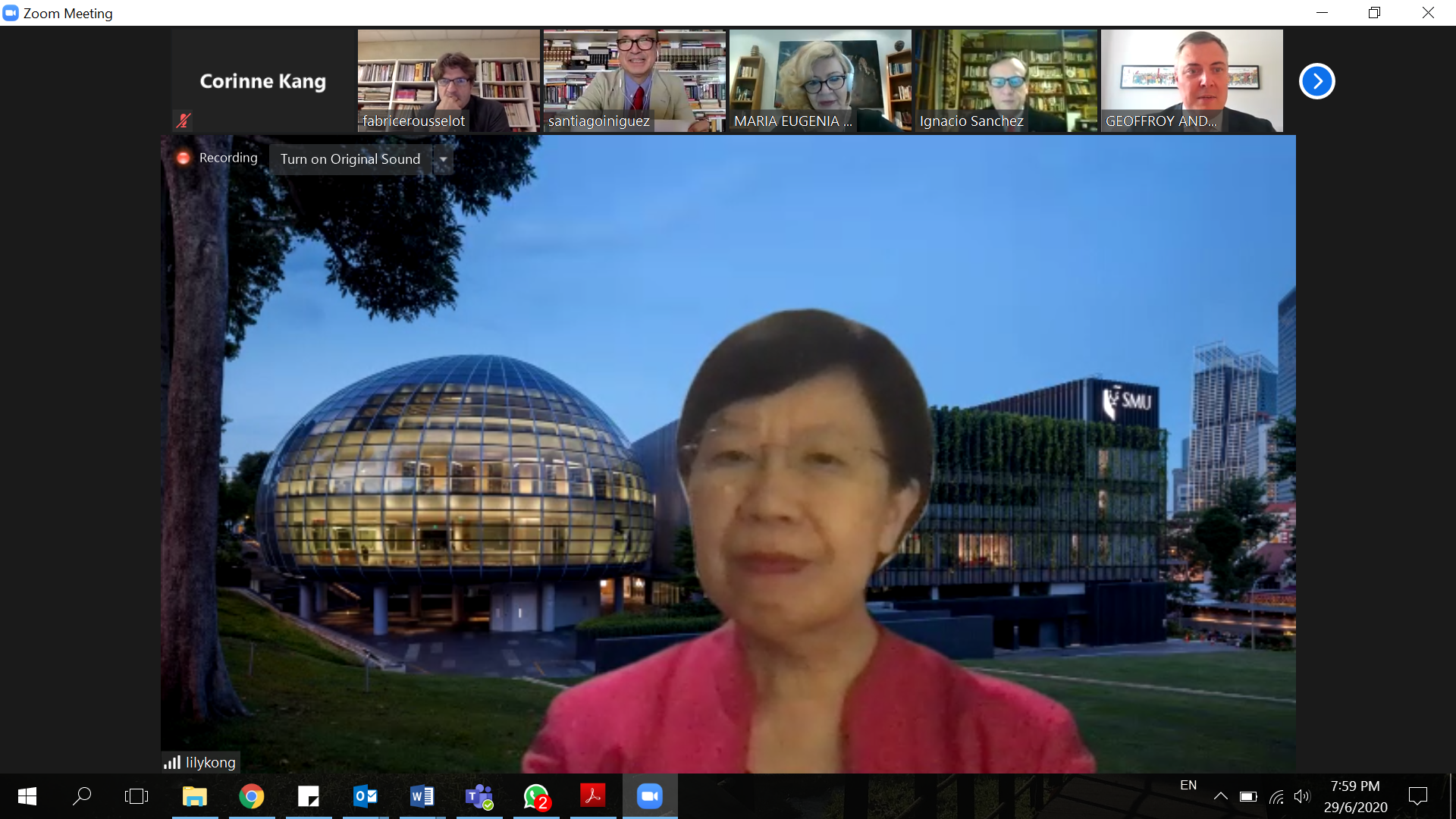
International mobility and cross-border knowledge sharing is core to higher education and must be preserved, say 33 university leaders from over 20 countries* in a joint statement initiated by IE University (IE), one of SMU’s close partners in Europe, in response to the impact of Covid-19 on higher education. The statement - “Mobility in higher education as a catalyst for resilience and renewal” was officially released on 29 June 2020.
All signatories of this statement were invited to participate in a joint event on the same day at 8pm (GMT +8) via zoom, to share and exchange ideas on this topic for the higher education sector. The virtual conference was hosted by IE University.
Opening remarks by Santiago Iñiguez, President of IE University

In his opening remarks, Santiago Iñiguez, President of IE University welcomed all from different time zones to the event. He shared a quote by Cardinal John Henry Newman, a former Oxford University Academic who had written a piece on universities and defined them as an “assemblage of strangers of all parts in just one spot.” This he feels, captures the essence of Universities well and he hopes that the joint statement is “the beginning of an action plan that allows us to transform the world of higher education and foster many different initiatives that will develop the future global society”.
President Iniquez also thinks that the pandemic and rampant populism may have threatened cross-border mobility of students and faculties’ ideas and talents. Thus, he believes that universities can play a key role in changing our environment.
He cited an analogy about the “Archimedean point”, where Archimedes' (a Greek mathematician, physicist, engineer, inventor, and astronomer) had allegedly said that if he had a fulcrum and a lever long enough, he could move the earth. He believes that Universities are similarly in a position to move our earth if we could mobilise all our strengths in order to make a better society. Thus, he hopes that the joint statement serves as a start and commitment to further action plans ahead. These include ensuring cross-border collaboration and nurturing diversity globally minded talent with a focus on sustainability, leveraging on technology to provide access to people coming from all latitudes and fostering inter-connectivity among the different stakeholders and also to create a much more effective University ecosystem to streamline cross border flow of talent and knowledge.
Remarks by Introductory Panel
Fabrice Rousselot, Editor for The Conversation France then moderated a robust panel discussion where five different University Presidents from five different regions – the American University of Beirut, Pontificia Universidad Católica de Chile, the University of Edinburgh and University of Miami – were invited to speak. The topics covered ranged from how the pandemic had affected mobility, the use of technology to enhance learning during the pandemic and how the pandemic offered a silver lining for some countries and universities.
When asked why the joint statement was significant for the Singapore Management University (SMU), Professor Lily Kong, President, SMU said that the University firmly believed in international mobility for its students and about 86% of its current students had some form of global exposure, be it an overseas community service project, an overseas internship or foreign exchange programme. Since 2018, global exposure has been made a graduation requirement. Hence, it is important for SMU to commit to the statement so that “we can continue to enable the cross border flow of student and cross cultural interactions. With greater understanding cross culturally, only then can we make the world a better place in the years ahead”.

Prof Kong added that two years ago, SMU had a Blue Ribbon Commission where the University evaluated how technology could be used to the best effect in a world where anyone could access readily available online courses easily. Eventually, it was concluded that “we had to go back to fundamentals and ask what was the philosophy of our students’ learning”.
She elaborated further and said that first, the student is an individual with individualised and personalised learning needs. Thus, we should use technology to enhance personalised learning rather than have mass learning for all. Second, the student is a social being, and thus learns from interaction and collaboration with his peers, and not from “a talking head on the screen as such”. Third, the student is a member of a larger community, and we want to inculcate a sense of responsibility back to that society. And again, “the use of technology to our mind is about using technology in the research and community projects that will benefit the society”.
Prof Kong is of the view that at the end of the day, technology can enhance but cannot replace the experience of physically being at another place and interacting with other people.
For Fadlo R. Khuri, President, American University of Beirut, he shared that Lebanon is the most diverse society in the Middle East with 18 different diverse communities. The pandemic had definitely affected its mobility as international faculty were separated from their families and many students who were accepted in foreign universities could not leave the country to pursue their degrees. Thus it was important to retain mobility, even though it may be virtual, and it was critical to maintain that link, not only for students/faculty with their homes, but with other universities to continue the cross flow of ideas. While there is a lot of despair around the world due to the COVID pandemic, he felt that Universities needed to step up to play a leadership role in using technology to continue to create new opportunities for learning. And with the joint statement, he felt that it will reaffirm the importance of a group of diverse institutions working closely together to use technology to overcome that fear.
Julio Frenk, President, University of Miami then shared that the United States has benefitted enormously from mobility and it receives about a million students from all over the world each year. This has generated an incredible level of vibrancy and diversity in the campuses and it greatly enriches the individual experience of American students – with youths of different backgrounds coming together to interact and exchange ideas, one can develop a “global citizenship”, in addition to “national citizenship”. Given the rise of populism, nationalism and xenophobia, developing this “global citizenship” is all the more critical.
He pointed out a silver lining as a result of the pandemic – one has seen “the highest intensity of collaboration I have ever witnessed in my lifetime”. Everyone is racing to develop better tests, better drugs and eventually a vaccine, and I have never seen this intensity of collaboration among scientists, and also from the government, universities and industry, from all over the world.
Peter Mathieson, President, The University of Edinburgh then spoke about how politics can affect higher mobility and it actually impinges on universities all the time. Thus, Universities need to adapt and function within the constraints. Prior to COVID-19, universities in the UK were very concerned about BREXIT as it affected European Union (EU) exchanges. The loss of ERAMUS – a programme to encourage mobility of students from UK and EU countries – was a serious blow. With the circumstances surrounding the UK and travel restrictions due to the COVID pandemic, this has enabled universities to cope and collaborate perfectly well such that programmes can be conducted virtually, digitally and to provide students with dual and joint degrees without leaving their home country.
Ignacio Sánchez Díaz, Rector, Pontificia Universidad Católica de Chile (PUC), Chile shared that at the start of the academic year this March, it was the first time that the University had to move teaching to virtual platforms. The whole semester had been done fully online and common challenges faced included issues with internet access and connections. He then shared that the priority of his University was to leverage on the use of technology to strengthen relationships within, between students, researchers and professors, as well as with staff, and relationships between different universities with regards to research and PhD programmes.
Representatives of the other signatory universities were then invited to say a few words each and they included senior leadership members from Hitotsubashi University, King’s College London, Koc University, London School of Economics and Political Science, Sciences Po, Tecnológico de Monterrey and the University of British Columbia.
Closing by Santiago Iñiguez, President of IE University
In his closing remarks, President Santiago Iñiguez of IE University echoed his opening statement and commented that all universities that had signed the joint statement shared the same vision and passion for education and for transforming the world. He concluded by saying that “the future is ours as far as we work hard to promote international mobility of students, faculty and talent, and we work for building up a world which is more inclusive, more diverse, more tolerant and more respectful for sustainability.”
* The 33 Universities that have endorsed the joint statement are:
- Fred Swaniker, Founder, African Leadership University, Mauritius
- Fadlo R. Khuri, President, American University of Beirut, Lebanon
- Christina Paxson, President, Brown University, US
- Rutger Engels, Rector magnificus, Erasmus University Rotterdam, The Netherlands
- Ahmad M. Hasnah, President, Hamad Bin Khalifa University, Qatar
- Lawrence S. Bacow, President, Harvard University, US
- Koichi Tadenuma, President, Hitotsubashi University, Japan
- Santiago Iniguez, President, IE University, Spain
- Edward Byrne, President and Principal, King’s College London, UK
- Umran Inan, President, Koç University,Turkey
- Andrea Prencipe, Rector, Luiss University, Italy
- Anthony Grayling, Master, New College of the Humanities, UK
- Martin Paul, President, Maastricht University, The Netherlands
- Ignacio Sánchez Díaz, Rector, Pontificia Universidad Católica de Chile, Chile
- Liu Wei, president, Renmin University of China, China
- Frédéric Mion, President, Sciences Po, France
- Lily Kong, President, Singapore Management University, Singapore
- David Garza, Rector and President-elect, Tecnológico de Monterrey, Mexico
- Dame Minouche Shafik, Director, London School of Economics and Political Science, UK
- Peter Mathieson, President, The University of Edinburgh, UK
- Alejandro Gaviria Uribe, Rector, Universidad de los Andes, Colombia
- Federico Valdes, Rector, Universidad del Desarrollo, Chile
- Felipe Portocarrero, Rector, Universidad del Pacífico, Peru
- Lucas Grosman, Rector, Universidad de San Andrés, Argentina
- Carlos Montufár, Rector, Universidad San Francisco de Quito, Ecuador
- João Sàágua, Rector, Universidade NOVA de Lisboa, Portugal
- Gianmario Verona, Rector, Università Bocconi, Italy
- Isabelle Huault, President, Université Paris Dauphine-PSL, France
- Santa Ono, President, University of British Columbia, Canada
- Mamokgethi Phakeng, Vice-chancellor, University of Cape Town, South Africa
- Julio Frenk, President, University of Miami, US
- Edeltraud Hanappi-Egger, Rector, Vienna University of Economics and Business, Austria
- Peter Salovey, President, Yale University, US
You can also read more about the event and statement here:
- Universities around the World Sign Joint Statement to Promote Mobility in Higher Education
- Universities commit to advancing mobility post-pandemic
- International academic mobility is a catalyst for renewal